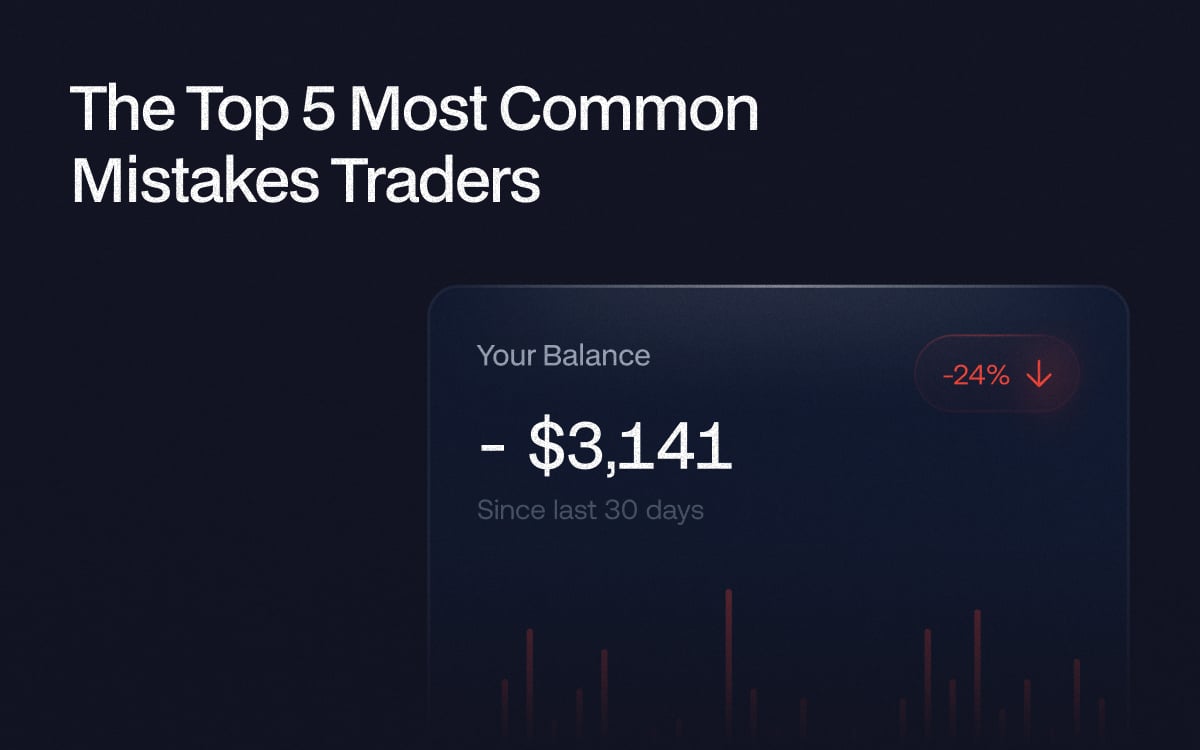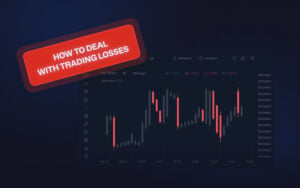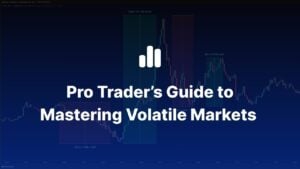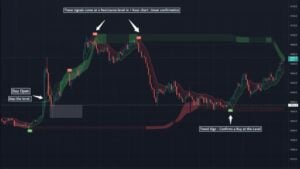In every trader’s journey, there comes a time when the market seems to be moving against you, no matter what you do. That confidence you had starts to fade, soon replaced by frustration and confusion when you suffer a string of losses. I know that what you’re experiencing is brutal, but very common, as there’s a saying in trading that you have to give something to the market first to gain something from it.
Most new traders keep losing because they often commit subtle mistakes or fall into the same traps again and again. The market always punishes the unprepared, and this can be avoided with simple rules and a little discipline. This guide will help you identify the common mistakes while trading and give you direction to avoid them smartly to succeed in trading.
Psychological Mistakes in Trading
In trading, psychology is as important as strength in techniques. You can have the best strategy in the world, but if your head isn’t in the game, you’re already lost. These are the internal battles that every trader faces and must learn to keep their mind straight.
1. Trading with Emotion (Fear & Greed)
You have to adopt a trader-first mindset to avoid trading with emotions, especially fear and greed. If you treat your trading setup and strategy as a business, income minus expenditure equals profits, you will realise that it requires discipline, objectivity, and most of all, emotional detachment. Instead of being right all the time, a trader’s goal should be to make a plan, execute it logically, and review it thoroughly should it fail. Rinse and repeat.
Fear and greed are the two emotions that are the twin engines of irrationality in trading. Fear makes you hesitate on your own analysis, which leads you to miss profitable entries or get out of winning positions too early. It’s that little voice telling you to sell when the market has a small dip, only to watch it go up without you.
Greed, on the other hand, makes you hold on to a winning trade for too long, hoping for every last cent. It can be very tempting, and most new traders ignore the height of their fall when the first few trades go well.
When you take a trade, you have to let go of the outcome and trust your analysis. A good practice can be to set your profit target and stop-loss the moment you enter a trade, and then walk away from your screen. Experienced traders always think in probabilities. One loss doesn’t mean your plan is broken, and just one win doesn’t make you a genius. You have to play the long game to survive in the market.
Read: How to Trade in Volatile Markets? 4 Crucial Investment Strategies by Pros2. Revenge Trading
Many new traders, when they start out, let their ego or pride get in the way of logic and analysis when the market goes against their expectations. The only way to win this battle between ego and logic is to take a break.
After a losing trade, close your charts, get up, and walk away. Go for a walk, grab a cup of coffee, or do something else to clear your head. You need a cool-down period to get rid of the frustration. You have to acknowledge the loss, learn what you can from it, and accept that it’s part of the game. Your next trade should be based on your strategy and analysis, not on a need to get even. I know taking a break won’t clear all the frustration, but it will keep you from making a bad decision after a loss.
I also understand that when a sure-looking trade goes bad, there is an intense urge to jump right back in to win back what you just lost. A losing trade can feel like a personal insult, and your ego convinces you that you can beat the market by force, but you must stay disciplined and think by keeping logic and sense above that urge.
3. Overconfidence
Even traders who have decades of trading experience always stay humble in front of the market because the market doesn’t care about your winning streak. Every single trade is an independent move, and success is built on consistency, not a few lucky breaks to get overconfident on. So keep in mind that you have to respect the market at all times.
This usually happens in the early stage of the trading journey, when you get a few back-to-back winning trades, and then you start believing you can’t lose. You feel like there is no downside and start oversizing the position, ignore risk rules and treat the market like it owes you money. I have seen many traders ride on this overconfidence and then fall so hard that they almost always quit trading because of those losses.
You have to remind yourself that even the best traders in the world have losing days, so you must stick to your plan no matter what. The goal is to survive and thrive over the long term, not to win every single battle.
Read: How to Develop a Winning Trading Strategy: Lessons from Successful Traders at Zeiierman TradingStrategy and Tool Blunders
A trading plan is a blueprint that defines your actions in the market. So, without a good plan, trading becomes reactive and impulsive, which leads to inconsistent results and a hole in the wallet.
4. Trading Without a Plan
If you can’t answer why you’re in a trade, when you’ll exit, and how much you’re risking, you’re flying blind without a plan.
You must create a clear trading plan before you risk a single dime. This plan should be your trading bible. It must have details like:
- Your strategy: What are your criteria for entering a trade? (e.g., specific chart patterns, indicator signals)
- Your exit rules: Where will you take profits? At what point will you cut your losses?
- Position sizing: How much capital will you risk on a single trade? You must define your risk appetite.
- Your pre-trade checklist: What must you check before you even consider entering a trade?
If a potential trade doesn’t meet every single point on your checklist, you don’t take it. Period.
Some traders start jumping into a trade because a stock chart looks good or because they got a tip from a friend or a telegram group. This is not a strategy, it is straight-out betting. Trading is about making calculated decisions based on valid analysis and solid structure. This is what differentiates a trader who will get a good long run in the market from a trader who will have few lucky wins and eventually exit the market when losses go over their head.
5. Chasing the Market (FOMO)
Most beginner traders have to understand that the market is full of opportunities, and patience is their best friend here. You don’t need to catch every single rocket ship. So instead of chasing a move, wait for a pullback to a key support level or for a proper entry signal that fits your strategy. If you missed the move, stay disciplined and let it go. There will always be another move coming around the corner that you can jump on.
Traders who are just entering the trading domain surf through social media, Telegram groups and Discord, their they see people post their profit screenshots, and they think to themselves, “Why am I not riding this profit wave?”. So they jump in, buy at the peak of a rally, only to watch it immediately crash down, leaving you holding the bag. This is the classic case of Fear of Missing Out (FOMO), and it’s a huge trap.
You have to make moves in the market based on your own bias, analysis, strategy and plan, not because others are making a move. There may come situations when the market doesn’t have the environment suitable for your plan, but you have to be patient with your plan to get going in the right context, even if others are enjoying that environment.
6. Misinterpreting indicators
Indicators are tools that can seriously give a much-needed edge in the market, but only if you understand their fundamentals and use them in the right place with the right context. People think indicators don’t work like they say it does, but it’s actually because people don’t understand the fundamental purpose of each indicator, or they get their indicator from sources that don’t give a proper description of the tool.
You must use indicators that are from a trustworthy and reliable vendor who gives a proper usage manual of indicators to get the best out of them.
Furthermore, here are some important things to remember while using indicators:
- Keep your charts clean and use a few indicators only, with each indicator serving a different purpose (like one for trend, one for momentum, and one for volatility).
- Don’t rely on a single indicator in isolation. Like if you’re watching MACD cross bullish, check if volume supports the move and whether price is breaking a key level.
- Indicators should support your analysis and not replace it. For example, if your chart shows a strong uptrend with higher highs and higher lows, then RSI showing overbought is simply confirmation of momentum, not an exact reversal sign.
- Use a lagging indicator(like MA or MACD) to confirm a trend, and then use a leading indicator (Fibanaaci or RSI) for a potential entry or exit point.
The Risk Management Missteps
There is a saying commonly used when talking about financial well-being that “Don’t try to get rich, just try not to get poor,” and this also somewhat applies in trading. You have to think and prepare for losses before gains. Risk management isn’t entirely about making money, but it’s a practice for staying in the game long enough to make it. This is the most crucial part of the entire process.
7. Ignoring Risk Management
Many new traders get obsessed with profit potential and give little to no thought to how much they could lose. They set unrealistic goals, chase 100% gains, and blow up their accounts by treating risk management as optional. It’s like focusing on how fast your car can go while ignoring whether the brakes even work.
To fix this:
- Adopt the 1–2% rule that says never risk more than 1–2% of your trading capital on a single trade.
- Set account-wide limits like for example, stop trading for the day if you’re down by 5% or 8%
- Always ask yourself: If this trade fails, can I still trade tomorrow? Like, if your account is $10,000, your maximum loss on any given trade should be no more than $100 or $200.
This might seem like a small number, but it’s the secret to longevity. It ensures that even if you have a string of ten losing trades in a row, you’re still in the game with plenty of capital left.
8. Not Using Stop-Loss Orders
A stop-loss order is an automatic command to sell your position if the price moves against you to a certain point. It’s your trading parachute, and skipping this step can be deadly for your trading dreams.
Use a stop-loss on every single trade. It should be a non-negotiable part of your trading plan. Calculate your stop-loss level before you even enter the trade, based on your risk management rules. Once you’ve set it, don’t move it. A professional trader focuses on risk first and profit second. Accept that being wrong is part of the game. Even professional traders lose 40–50% of the time.
Many traders convince themselves that “the market will turn around” or “I’ll just hold until it comes back.” Sometimes it does, but mostly it doesn’t, and then the spiral losses are huge. Therefore, you must always take caution when making a move in the market.
9. Using Too Much Leverage
Leverage in trading means borrowing money from your broker to open a bigger trade than your actual account balance would normally allow. It is a double-edged sword that can multiply your gains but also your losses quite fast. You have to be incredibly conservative with leverage, especially when you’re starting out. Use it very little, or not at all, until you have a proven strategy that gives you consistently profitable results. Even if you start using leverage more often than you must absolutely understand the margin requirements and liquidation risks. Also, you must focus on risk per trade, not position size. Even with leverage, your loss should never exceed 1–2% of your capital.
Many brokers lure traders with 25x, 50x, and even 100x leverage. New traders see it as a shortcut to fast profits and do not realise how tiny moves against them can instantly liquidate their accounts.
Every trader, no matter how skilled, has made most of these mistakes at some point. Also, the thing that separates professionals from amateurs is not perfection but the ability to learn and adapt. Don’t look at mistakes as failures, but you should actually treat them like tuition fees paid to the market for the learnings. The market rewards those who respect risk and punish those who chase shortcuts. If you can keep your emotions aside, stick to your plan, and manage your losses, profits will eventually follow.






